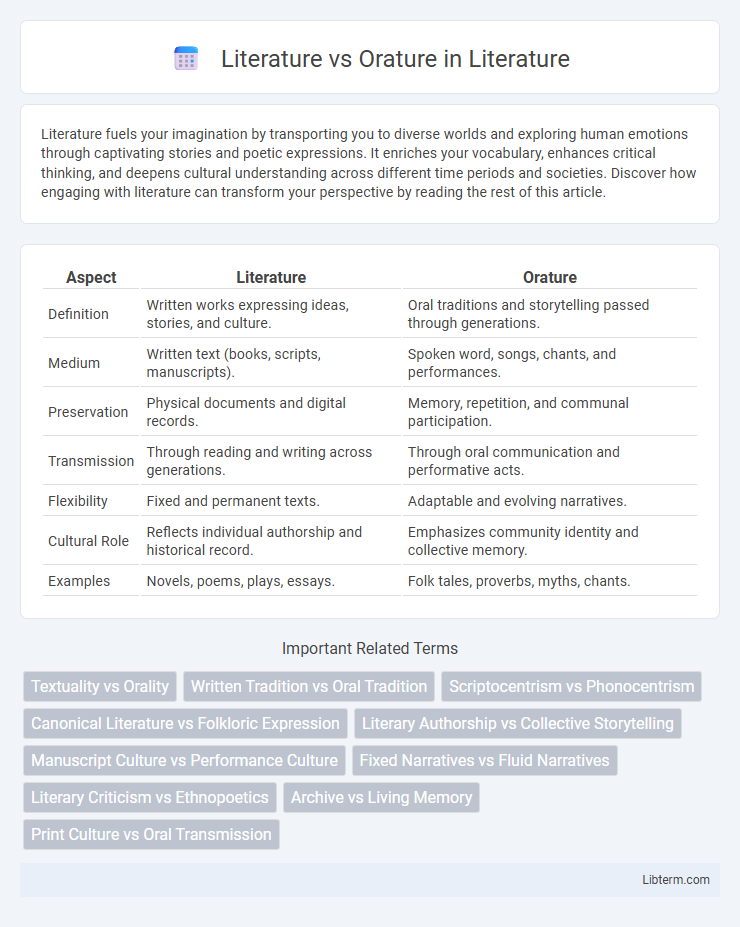Literature fuels your imagination by transporting you to diverse worlds and exploring human emotions through captivating stories and poetic expressions. It enriches your vocabulary, enhances critical thinking, and deepens cultural understanding across different time periods and societies. Discover how engaging with literature can transform your perspective by reading the rest of this article.
Table of Comparison
| Aspect | Literature | Orature |
|---|---|---|
| Definition | Written works expressing ideas, stories, and culture. | Oral traditions and storytelling passed through generations. |
| Medium | Written text (books, scripts, manuscripts). | Spoken word, songs, chants, and performances. |
| Preservation | Physical documents and digital records. | Memory, repetition, and communal participation. |
| Transmission | Through reading and writing across generations. | Through oral communication and performative acts. |
| Flexibility | Fixed and permanent texts. | Adaptable and evolving narratives. |
| Cultural Role | Reflects individual authorship and historical record. | Emphasizes community identity and collective memory. |
| Examples | Novels, poems, plays, essays. | Folk tales, proverbs, myths, chants. |
Introduction to Literature and Orature
Literature refers to written works such as novels, poems, and plays that express ideas, emotions, and stories through structured language, often analyzed for themes and stylistic devices. Orature encompasses oral traditions like storytelling, folktales, songs, and oral histories passed down verbally within communities, emphasizing performance and cultural transmission. Both serve as vital cultural expressions, with literature preserving ideas in physical form and orature maintaining communal and historical knowledge through spoken word.
Defining Literature: Written Traditions
Literature refers to written works that capture human experiences, emotions, and ideas through structured language, encompassing genres like poetry, prose, and drama. It is characterized by permanence and accessibility, allowing texts to be preserved, studied, and transmitted across generations. Written traditions in literature provide a standardized form, enabling critical analysis and interpretation within cultural and historical contexts.
Understanding Orature: The Power of Spoken Word
Orature embodies oral traditions where stories, histories, and cultural knowledge are preserved and transmitted through spoken word, emphasizing voice, intonation, and communal interaction. Unlike literature, which relies on written texts, orature thrives in performance and memorization, reinforcing cultural identity and collective memory. Understanding orature reveals its dynamic role in sustaining heritage and empowering marginalized narratives beyond the constraints of written language.
Historical Evolution of Literature and Orature
Literature, traditionally rooted in written texts, evolved through ancient civilizations such as Mesopotamia and Egypt, enabling the preservation of cultural narratives, laws, and philosophies across generations. Orature, the oral transmission of stories, histories, and knowledge, predates written literature and remains vital in many indigenous cultures, relying on memory, performance, and communal participation for its evolution. The historical evolution of literature and orature highlights a shift from primarily oral cultures to literate societies, yet both forms continue to influence each other in preserving and transmitting human experience.
Cultural Significance of Orature in Oral Societies
Orature serves as a vital cultural repository in oral societies, preserving history, values, and traditions through storytelling, songs, and rituals. Unlike written literature, orature is dynamic and communal, enabling adaptation and collective participation that reinforce social cohesion. This oral transmission sustains cultural identity and intergenerational knowledge, ensuring the survival of indigenous wisdom across time.
Preservation and Transmission: Written Texts vs Oral Narratives
Literature relies on written texts, which ensure accurate preservation and consistent transmission of narratives across generations by providing fixed, tangible records. Orature depends on oral narratives, characterized by dynamic, flexible storytelling that adapts to cultural contexts but risks alterations with each retelling. The fixed nature of written literature contrasts with the fluid, communal nature of orature, highlighting different mechanisms for cultural memory and knowledge dissemination.
Artistic Techniques in Literature and Orature
Literature employs structured narrative forms such as metaphor, allegory, and detailed character development to convey complex themes and evoke imagery through written text. Orature relies heavily on oral performance techniques including intonation, rhythm, repetition, and improvisation to engage audiences and preserve cultural stories dynamically. Both artistic approaches utilize symbolism and storytelling, but literature emphasizes textual analysis while orature thrives on communal participation and auditory elements.
Impact on Identity and Collective Memory
Literature, as a written form, preserves identity and collective memory through fixed texts that enable intergenerational transmission of cultural values, history, and beliefs with consistency. Orature, encompassing oral traditions like storytelling, songs, and proverbs, deeply embeds identity and memory within lived experiences by allowing fluid, communal participation and adaptation, reinforcing social bonds and shared heritage. The dynamic interplay between literature and orature shapes the ways communities understand themselves and maintain continuity of their cultural narratives over time.
Challenges and Opportunities in Modern Contexts
Literature, characterized by written texts, often faces challenges such as digital piracy and diminishing attention spans in modern contexts, while orature, rooted in oral traditions, confronts the risk of cultural erosion but benefits from the resurgence of audio platforms and oral storytelling podcasts. The convergence of literature and orature presents opportunities for hybrid formats like audiobooks and narrative performances, enhancing cultural preservation and accessibility. Efforts to digitize oral histories and integrate multimedia elements in literary works foster innovative educational tools and promote cross-cultural understanding.
Conclusion: Bridging Literature and Orature
Bridging literature and orature enhances cultural preservation by integrating written texts with oral traditions, enriching both forms of expression. This synthesis fosters deeper understanding and appreciation of diverse narratives, empowering communities to share their heritage across generations. Emphasizing collaboration between literary scholarship and oral storytelling strengthens the continuity and vitality of cultural knowledge worldwide.
Literature Infographic

 libterm.com
libterm.com